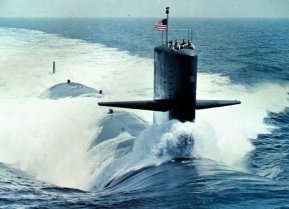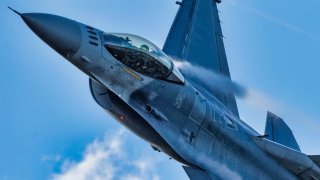Russia Is a 'Great Power in Decline' That Can Still Fatally Damage NATO
Will Russia be a great power in decline, or does Putin still have something up his sleeve for the Atlantic Alliance? The short answer is both. Russia is sliding ever further downhill, but it can still fatally damage NATO's security.
Will Russia be a great power in decline or does Putin still have something up his sleeve in store for the Atlantic Alliance?
The short answer is both.
Russia is sliding ever further downhill but it still can fatally damage the security of NATO.
Russia has been a state in decline since the USSR collapsed, absolute decline in the 1990s especially. Despite the attempts to signal its influence at the recent BRICS summit, it continues to suffer the consequences of Putin’s catastrophic decision to invade Ukraine in 2022, including the rapid acceleration of dependence on China. A state that is an economic and diplomatic junior partner of Beijing and militarily reliant on Iran and North Korea is not, by any stretch of the imagination, a great power.
And yet, despite this, Russia retains the will and the capabilities to inflict lasting, maybe fatal damage on NATO. Two policies have proved particularly successful so far; neither requires Russia to be a great power for them to work.
The first is a set of approaches designed to both test and demonstrate NATO’s lack of resolve. Moscow’s signaling seems to have persuaded the Biden administration that it is too dangerous for the U.S. to enable, or allow its allies to enable, Ukraine to take the steps needed to defeat Russia.
While committing to this, it appears to have transformed nuclear deterrence into a one-way process, deterring NATO but allowing Russia to escalate without consequences. Having pushed open this door, Putin is unlikely to close it again voluntarily. As a result, we can expect more nuclear blackmail to pressure alliance decision-making in the future, and probably not from Russia alone.
At the same time, Moscow is testing the boundaries of NATO in Europe with rapidly escalating attacks on critical infrastructure including transport and energy networks. Affected states and NATO collectively have not, so far, decided that they crossed the threshold for a military response, and the attacks are continuing. Like the nuclear threats, they signal NATO's vulnerability and reluctance to act against its adversaries and competitors around the world.
The ability to push boundaries with few significant consequences has been made easier by another successful Russian method for undermining NATO: domestic interference.
Disinformation, election interference, and the use of what increasingly look like client parties inside member states such as Hungary, Austria, Germany, and, it must be said, the United States, are undermining the prospects for a coherent response to the threats from Russia. They are also widening splits inside the alliance, increasing the chances that it will either fracture or continue a formal existence but be paralyzed; either would suit Russia.
The disastrous decision to invade Ukraine has accelerated Russia’s long fall from great power status, but NATO’s uncertain response has also created new opportunities for Putin, or whoever eventually succeeds him, to weaken and humiliate the alliance. Unless Russia is denied the kind of peace that it would take as a victory over both Ukraine and the West, the kind of frozen conflict in which it has specialized for the last thirty years, it will pose an ongoing threat to the U.S. and its European allies, inviting other, more powerful states to do the same.
About the Author:
Dr. Ruth Deyermond is a Senior Lecturer (Associate Professor) in Post-Soviet Security at the Department of War Studies, King’s College London. Her primary research expertise is in Russian foreign and security policy, particularly about the West and the states of the former Soviet Union, and US policy towards Russia. She has been a frequent media contributor on the issue of the current war in Ukraine and has given evidence on the war to the UK Parliament’s National Security Strategy Joint Committee.
Image Credit: Creative Commons and/or Shutterstock.


